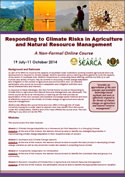A Non-Formal Online Course
19 July-11 October 2014
Background and Rationale
As part of its effort to improve the capacity of Southeast Asian institutions working towards agricultural and rural development to respond to climate change, SEARCA launched various learning events geared to build the capacity of key actors in Southeast Asia. SEARCA’s experience in conducting these offerings pointed out that (1) a vast number and variety of topics may be covered in discussing climate change adaptation and mitigation in the context of agriculture and environment; and (2) intended participants who would be involved in adaptation and mitigation activities have varied characteristics and interests.
In response to these challenges, the Non-Formal Online Course on Responding to Climate Risks in Agriculture and Natural Resource Management was developed. The online course serves as an introductory e-Learning service that provides an appreciation of the core concepts and available knowledge-based methods and tools to effectively respond to the threats of climate change on agriculture and natural resource management.
SEARCA had offered the course thrice and now offers it through the UP Open University hoping for a wider reach to learners who may benefit from the course. Under this collaboration, SEARCA and UPOU have offered the course once. The next offering in July 2014 will be the fifth.
Modules
The course covers five main modules:
| Module Title | Objective | |
| Module 1: | Climate Change Adaptation as a Framework for Risk Reduction in a Changing Climate | At the end of the module, the learners should be able to identify key strategies/approaches in mainstreaming climate change adaptation in their respective areas of concern. |
| Module 2: | Southeast Asia Climate Change Scenario | At the end of the module, the learners should be able to explain the basic process in developing climate change scenarios as well as why ensemble models are needed in projecting future climate. |
| Module 3: | Vulnerability Assessment: An Introduction | At the end of the module, the learners should be able to identify the vulnerable sites and groups in a community. |
| Module 4: | Economic Valuation of Climate Risks in Agriculture and Natural Resource Management | At the end of the module, the participants should be able to identify the appropriate economic valuation tool/s that can be used to estimate the value of climate change impacts as well as the costs and benefits of adaptation and mitigation strategies. |
| Module 5: | Managing Risks in Agriculture and Natural Resource Management due to Climate Variability | At the end of the module, the participants should be able to explain the conditions required to effectively manage climate risk as well as the application of climate information in managing such risks in the agriculture and natural resources sector. |
 Click here to download brochure for more information
Click here to download brochure for more information
Potential Clients
Those about to start active involvement in, or are relatively new at implementing, climate change adaptation initiatives in the agriculture and natural resources sector in Southeast Asia and other interested individuals outside the region, specifically:
- Government planners and technical staff at the regional, national and local levels;
- Researchers and practitioners; and
- Representatives and staff of regional or national NGOs.
Course Fees: Php 5,500.00 (including miscellaneous fee of Php 500.00) or USD 215.00
For further information, please contact:
Mr. Larry N. Cruz
University Extension Associate
Faculty of Management and Development Studies, UP Open University
Telefax: (+6349) 536-6010 ; Trunkline: (+6349) 536-6001-6 local 821
Email address: , ,
Website: www.upou.edu.ph